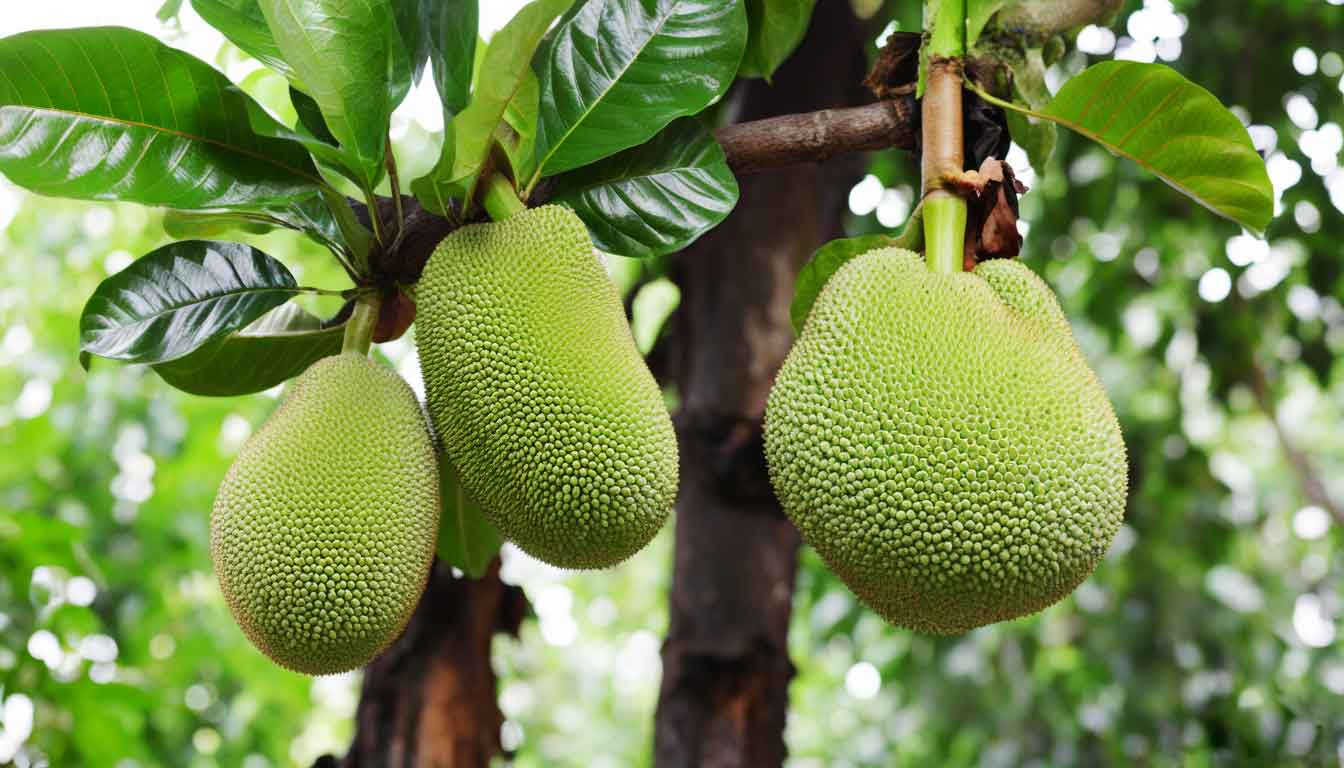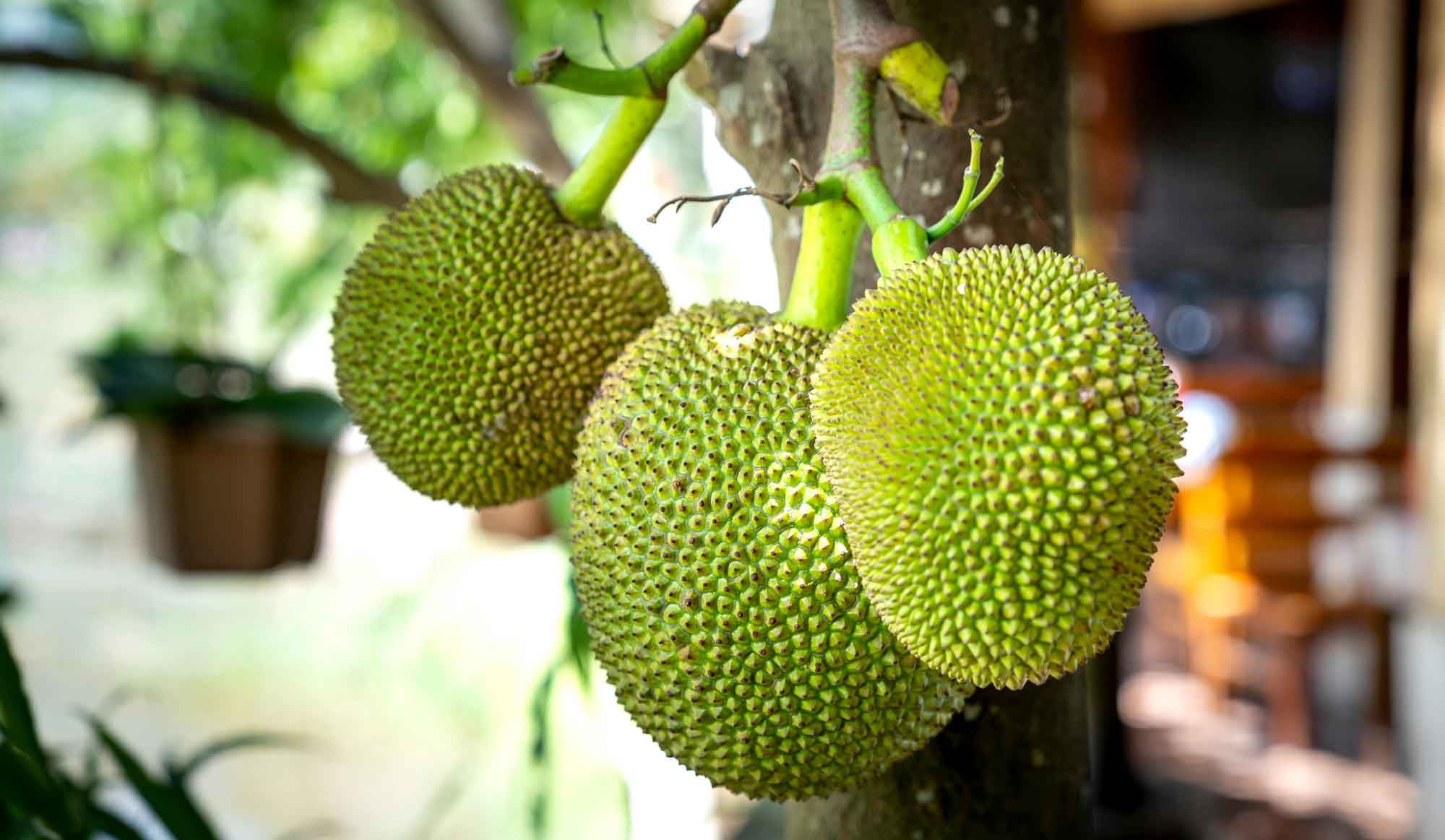Why Jackfruit is Healthy : Jackfruit is a tropical fruit that’s becoming popular for its tasty flavor and impressive nutritional benefits. It’s unique because it has more protein than many other fruits and is full of essential vitamins and minerals.
What is Jackfruit?
Jackfruit is a large tropical fruit that belongs to the Moraceae family, which also includes figs and mulberries. It originates from South India and is known for its spiky outer skin. Remarkably, it can weigh up to 80 pounds (35 kg), making it the largest tree fruit in the world. The flavor of jackfruit is often described as a mix of apples, pineapples, mangoes, and bananas.
Jackfruit is very versatile and is often used as a meat substitute in vegan and vegetarian dishes because of its texture, which resembles shredded meat. While it grows well in tropical climates and serves as a key food source in some developing regions, jackfruit is becoming easier to find in grocery stores worldwide, especially in summer when it’s in season.
The fruit pods inside the jackfruit are the most commonly eaten part, and they can be enjoyed when ripe or unripe. You can use jackfruit in a variety of recipes, from desserts to savory curries, and the seeds are also safe to eat.
Jackfruit is a unique and nutritious tropical fruit enjoyed around the world with many culinary uses.
Nutritional Benefits of Jackfruit : Why Jackfruit is Healthy
Jackfruit has a fantastic nutritional profile. A one-cup (165-gram) serving provides approximately:
- Calories: 155
- Carbohydrates: 40 grams
- Fiber: 3 grams
- Protein: 3 grams
- Vitamin A: 10% of the Recommended Daily Intake (RDI)
- Vitamin C: 18% of the RDI
- Magnesium: 15% of the RDI
- Potassium: 14% of the RDI
- Copper: 15% of the RDI
- Manganese: 16% of the RDI
- Riboflavin: 11% of the RDI
Unlike many other fruits, jackfruit offers over 3 grams of protein per cup, whereas similar fruits like apples and mangoes typically provide only 0–1 grams. Additionally, jackfruit is rich in antioxidants, which contribute to its health benefits.
Jackfruit is highly nutritious, providing a great mix of calories, fiber, vitamins, and minerals.
Blood Sugar Control
Jackfruit may help with managing blood sugar levels due to its low glycemic index (GI). Foods with a low GI do not cause rapid spikes in blood sugar. The fiber in jackfruit helps slow down digestion, stabilizing blood sugar levels. Research indicates that jackfruit extract can improve blood sugar levels in adults and has shown positive effects in diabetic mice.
Jackfruit’s low glycemic index and fiber content can support better blood sugar control.
Jackfruit’s Antioxidant Properties
Jackfruit is packed with antioxidants, which can help protect your body from damage caused by free radicals. Some important antioxidants found in jackfruit include:
- Vitamin C: Known for its anti-inflammatory properties, which may reduce the risk of chronic diseases.
- Carotenoids: These compounds may help lower inflammation and reduce the risk of diseases like type 2 diabetes and heart disease.
- Flavanones: They may assist in regulating blood sugar, blood pressure, and cholesterol levels.
The antioxidants in jackfruit can help lower the risk of chronic diseases such as heart disease and diabetes.
Additional Health Benefits of Jackfruit
While further research is needed, jackfruit is believed to offer several other health benefits:
- Immune Support: The vitamins A and C in jackfruit may boost your immune system.
- Skin Health: Nutrients and antioxidants in jackfruit could enhance skin health and slow the aging process.
- Heart Health: Potassium, fiber, and antioxidants in jackfruit may contribute to heart health.
Jackfruit has also been traditionally used in some cultures to treat various ailments, although these uses lack scientific validation.
Jackfruit may have additional health benefits, including supporting immune function, improving skin health, and protecting the heart.
Risks of Eating Jackfruit : Why Jackfruit is Healthy
Most people can safely enjoy jackfruit, but there are a few things to consider:
- Allergies: Some people, especially those allergic to birch pollen, may have reactions to jackfruit.
- Blood Sugar Levels: Those with diabetes should monitor their blood sugar levels closely, as jackfruit can lower blood sugar.
Overall, jackfruit is safe for most people to eat and doesn’t typically cause serious side effects.
While jackfruit is generally safe, individuals with allergies or specific health conditions should be cautious.
How to Prepare and Enjoy Jackfruit
Jackfruit is incredibly versatile and can be eaten raw or cooked. Here’s how to prepare it:
- Cut the Fruit: Slice the jackfruit in half and remove the yellow fruit pods and seeds from the skin and core. Wearing gloves can help with the sticky texture.
- Cooking Options: Use unripe jackfruit in savory dishes and ripe jackfruit in desserts.
- Canned Jackfruit: If fresh jackfruit is hard to find, you can use canned jackfruit, which is a convenient option.
You can incorporate jackfruit into many recipes, such as tacos, curries, or added to yogurt and oatmeal. The seeds can be roasted or boiled and seasoned for a tasty snack.
Jackfruit can be enjoyed in many delicious ways, making it a fun and nutritious addition to your diet.
Conclusion
Why Jackfruit is Healthy : Jackfruit is an incredibly healthy fruit with numerous benefits. Its high nutrient content, antioxidant properties, and potential for blood sugar management make it an excellent choice for a balanced diet. Whether you eat it fresh, cooked, or canned, jackfruit offers a unique flavor and texture that can enhance a variety of dishes. If you’re looking for a nutritious and versatile food, adding jackfruit to your meals is definitely worth considering!











